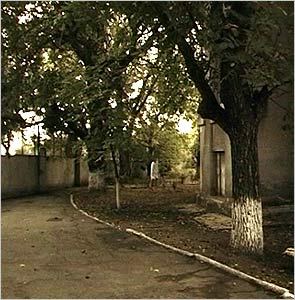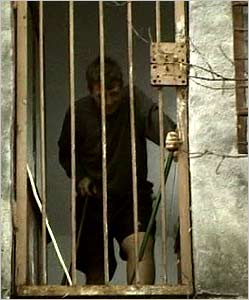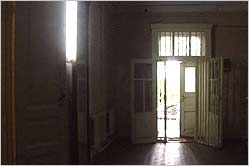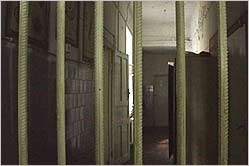It's got no name; one just says "the in-patients".
It used to be a leper asylum. Now it is the in-patient department of the Odessa AIDS centre. For patients with infectious diseases have to be accommodated off the city limits.

In the AIDS centre of the polyclinic we didn't get to see AIDS patients. According to a newly issued law, patients with infectious diseases have to be accommodated off the city limits. The in-patient department of the AIDS centre is located in the wasteland on the outskirts of town.
There is no public transport out here and no signboard. If one has no car, one has to walk from here. It is still a distance of three kilometres and who isn't acquainted with the path, will have difficulties in finding it. The patients get few visitors. Equally the seriously ill have to cover the same distance, when they have to go into town for check-ups. There is no laboratory, no X-ray unit out there - only a single, virtually unsprung delivery van. And if the van is broken, the patients have to walk up to the main road and wait for the bus there.
Here, it is hidden behind this wall. It's got no name; one just says "the in-patients". It used to be a leper asylum. The year before the barbed wire was removed from the walls. But all of the doors and windows are still welded with bar-iron.
The house is designed for 25 patients. At the moment 38 are actually accommodated here. Currently three are dying a week.
There is too much death here. Everyday someone dies
Patients: "There is too much death here. Everyday someone dies. You're talking to someone and suddenly he's gone."
"We carry them out ourselves, every day. Otherwise nobody would do it. It's usually in the morning. One wakes up and sees the person has died."
"If he is lying in a coma, the dying can take three or four days. Screaming. After all, lying in the same room, one sees how he dies"
Inge Banczyk: "Those who die there, die without pain treatment. That is, there's no morphine for AIDS-patients in the terminal stage. No opiates. The only pain relievers I've seen here were Aspirin and Paracetamol. And it can't be due to the money, Opiates are dirt-cheap here. - That is inhuman."
"We carry them out ourselves, every day. Otherwise nobody would do it. It's usually in the morning. One wakes up and sees the person has died."
"If he is lying in a coma, the dying can take three or four days. Screaming. After all, lying in the same room, one sees how he dies"
Inge Banczyk: "Those who die there, die without pain treatment. That is, there's no morphine for AIDS-patients in the terminal stage. No opiates. The only pain relievers I've seen here were Aspirin and Paracetamol. And it can't be due to the money, Opiates are dirt-cheap here. - That is inhuman."



"The in-patient" on the edge of Odessa
All the doors and windows are still welded with bar-iron
